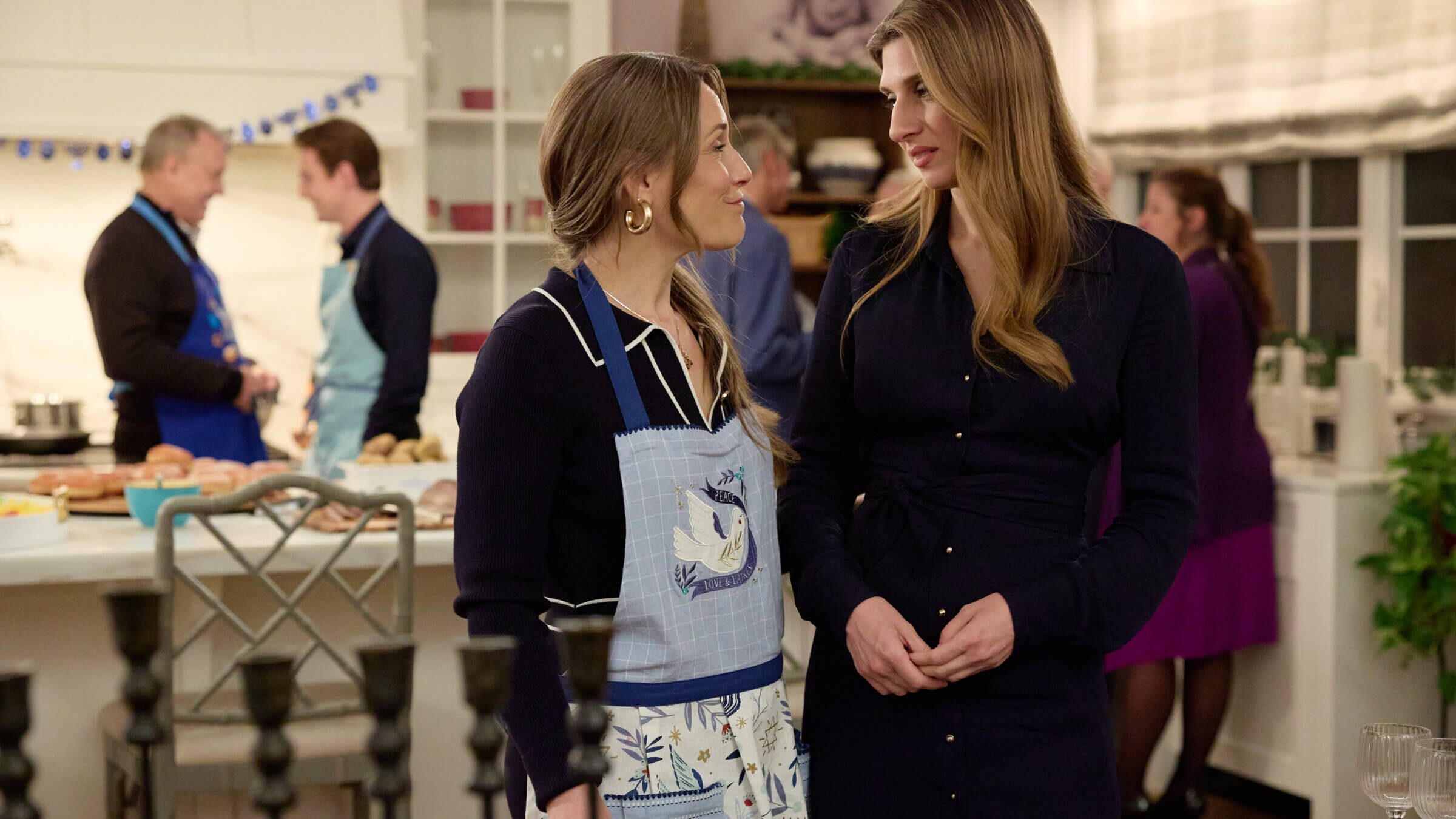Hallmark’s ‘Leah’s Perfect Gift’ gets interfaith relationships right — and a whole lot else wrong
The new Hallmark film about a Jewish woman celebrating Christmas is more sensitive than you might imagine

Emily Arlook (right) as Leah Goldberg is a redeeming aspect of this otherwise sickly sweet film. Courtesy of Hallmark
Prior to watching Leah’s Perfect Gift, I had never seen a Hallmark movie from start to finish. But thanks to SNL, The Simpsons, and countless Forward articles, I already had the script down pat in my head.
From what I gathered, these films reinforced traditional gender norms and a conservative, Christian worldview. They began with a stressed-out career woman in New York moving to a small town for the holidays, and they inevitably ended with marriage and Christmas magic. The films came in big batches each year with little variation, like endless trays of paper-thin sugar cookies. And while there have been efforts to add more diversity into the company’s ouevre in recent years, even Hanukkah-centric or queer-friendly Hallmark films stuck to the same, frothy recipe.
So, when I got the opportunity to watch Leah’s Perfect Gift this week, Hallmark’s 2024 film about a Jewish woman celebrating her first Christmas, I was ready to cringe. Hard. I imagined my favorite writers lambasting the sexist depiction of career-minded women being forced to give up their dreams for the sake of marriage. I also braced for the barrage of social media hot takes about how the film bastardized Jewish customs. (Would they pronounce “Sufganiyot” as “Sufjan Stevens” or something?)
But then I realized something: Perhaps I was being a preemptive Hallmark Hater, a ghoulish Grinch. I was letting social media (and other respected Jewish culture journalists) decide my opinions for me. All I knew was the premise: Leah Goldberg is spending her first Christmas at her boyfriend Graham’s house in Connecticut, where she butts heads with Graham’s uptight family. That’s it. How could I form an opinion based on that information alone?
So, I closed every news tab on my computer, and I muted social media on my phone. If Leah could enjoy her first Christmas with Graham’s family in Connecticut, I could withstand 90 minutes of screentime without letting other people’s Hallmark criticisms cloud my judgment.
The ensuing film moved and genuinely surprised me. Leah’s Perfect Film promoted a message of embracing, not fearing change around the holiday season, and it sensitively handled its depiction of a Jewish person in an interfaith relationship, albeit with a nauseating heaping of sappiness.
“You can’t play with me about Christmas, Graham”
Let’s get the obvious out of the way. Leah’s Perfect Gift is a trite, unoriginal movie. It follows almost every rom-com cliche in the book. Every character is an archetype —the self-effacing. hunk boyfriend Graham (Evan Roderick); his waspy mom Barbara (Barbara Nevin);his token sassy, lesbian little sister Maddie (Sidney Quisnelle). The only person of color in the film is a cashier at a holiday store who provides the protagonist with guidance, but has no depth of her own. To call the film progressive because it stars a blonde-haired Jewish actress is pushing it.
Every member of Graham’s family falls neatly into their box of smirks, angsty eyerolls and judgmental glares, to the point that dinner scenes seem like they were written by A.I. (I half-expected to see deformed fingers on the actors’ hands.) But people don’t watch Hallmark movies expecting Aaron Sorkin-level dialogue or Breaking Bad level character development. They watch them to be warmed up and entertained, and in that, Leah’s Perfect Gift strikes gold with its star.
Emily Arlook, previously known for her role as Nomi Segal on the sitcom Grown-Ish, delivers a genuinely funny and affable performance as Leah Goldberg. Leah, excited for her first Christmas and aching for Graham to propose, is quick-thinking, helpful to others and earnest about her love for the holiday. She is sprightly, resilient and easy to root for.
As she tells her cousin Sarah early on at a Hanukkah party, Leah’s love for Christmas has nothing to do with religion. She has no intention of converting to Christianity after Graham proposes, and she is not ashamed of being Jewish, either. Leah’s love for the holiday instead has to do with her desire to connect with her hopeful fiance’s family, and to experience the culture she has seen constantly represented in pop culture growing up.
“I didn’t know Christmas would be this hard!”
As the film goes on, Leah attempts to woo Graham’s family by being the perfect future daughter-in-law. Unlike Hallmark stereotypes, the film doesn’t punish Leah for being ambitious and highly educated. Leah is an app developer with a Master’s in food engineering: skills that help her out in a family gingerbread contest, or in making small talk with Graham’s dad.
Sure, Leah fits some stereotypes of Jewish women being Type A or overbearing, but the characters don’t judge Leah for being Jewish, and both Leah and Graham demonstrate respect for each other’s skills. If anything, much of the film’s comedy comes at the expense of Graham’s family being too posh and behind-the-times.
The film’s conflict is not one of Christianity versus Judaism, but rather of tradition versus modernity. Barbara is cold because she cannot see her children as independent adults, such as Graham wanting to eschew his family’s banking business, or Maddie wanting to delay business school to start her own artisanal pickle business in Brooklyn (#relatable.) Fear of change is what drives Barbara to cling to a Hallmark-esque past, which drives the film’s hijinks and conflict.
Is the movie hackneyed and lazily written? Absolutely. But does it mock its Jewish characters, or does the script portray Leah as some kind of Soros-funded feminist who infringes upon beloved small-town Christmas traditions? Not at all. In a notably un-Hallmark twist, it’s the small-town family who has to embrace change and make space for Leah’s talents, whereas the Jewish protagonist and her family are open-minded and lovable.
“We’re going to be mishpoche!”
As per other Jewish representation in the film? It’s a mixed bag. There were indeed some fumbles early on. When visiting her parents for Hanukkah in the movie, Leah insists that it is normal to bring challahs as a gift to any Jewish holiday. (I have never seen people bring challahs to a Jewish holiday other than Shabbat, but my email inbox is open.)
I also cringed at a joke where Leah confuses her mother’s Julia Child quotes for Maimonides. There are many Jewish mothers in my life, and trust me, very few invoke the Rambam when cooking latkes. Even fewer grate potatoes prior to peeling them, as I noticed in the background of one shot!

The film is also based on the book Leah’s Perfect Christmas by Catherine Beck, an author who celebrates both Christmas and Hanukkah at home in real life. Having authentic Jewish creatives helming the production paid off. Before heading to Connecticut, the film includes an extended scene of Leah lighting a Hannukiah with Graham smiling and nodding along to the candle lighting prayer. The scene, however short, demonstrates how Leah is in touch with both Jewish heritage and prayer, in addition to her curiosity about Christmas. She is a complex, but self-assured person.
What’s more, Hallmark cast actual Jewish actors in all three major Jewish roles. Beyond the ethical considerations of Jewish actors playing Jewish characters, the authentic casting helped when it came to pronouncing certain Hebrew and Yiddish words. (Leah’s pronunciation of “Sufganiyot,” believe it or not, was actually only a little bit weird.)
Pass the artisanal pickles
A 2020 Pew Research Center study found that 61% of American Jews who have gotten married since 2010 have married someone outside their faith. That’s a significant increase from decades ago. Among American Jews who married between 1980 and 1999, only 40% are intermarried, said the same survey. Relationships like Leah and Graham’s are an increasingly common fact of 21st century Jewish American life.
Leah’s Perfect Gift, for all its cloyingness, represents something real. The blended family depicted here is a Disneyfied version of real culture clashes and contradictions many young American families face today. When the final scene of the film rolled, and the two families crowd around a Chinese restaurant on Christmas Day, passing around noodles and Maddie’s artisanal pickles, I couldn’t help but tear up.
Sure, there are logical inconsistencies in the scene, as there are in the whole movie. (How, for example, did Maddie sneak her pickle jars into the Chinese restaurant, and where did all those party favors come from?) But turn your brain off, and the film is cozy and sweet, which is all a Chrismukah rom-com ought to be. Onto the next batch.

















